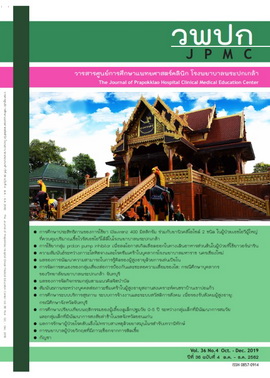Self-Management in Risk Groups for Preventing and Slowing The Progression of Kidney Diseases: A Case Study in The Personnel of Phrapokklao Nursing College
Main Article Content
Abstract
Background: End-stage renal disease affects both quality of life and financial status. Self-management to prevent kidney diseases and slow kidney failure among risk groups can help increase awareness and improve health behaviors to inhibit end-stage renal failure.
Objectives: To compare knowledge, attitude, behaviors, and estimated glomerular filtration rate (eGFR) before and after the intervention.
Materials and methods: This quasi-experimental one-group pre-post design research was based on the notion of self-management by Creer. The sample comprised 41 personnel who were at risk of kidney disease, consisting of 21 nurse lecturers and 20 back-office staff in Phrapokklao Nursing College. The research tool for data collection was a questionnaire composed of 3 parts: knowledge, attitude, and behavior. Data were analyzed by descriptive statistics and paired t-test.
Results: The mean scores of knowledge to prevent kidney diseases and slow kidney failure and eGFR were not significantly different comparing before and after the intervention (t = 1.65, p = 0.11 and t = 0.20, p = 0.84). However, after the intervention, the mean scores of attitude and behavioral change to prevent kidney diseases and slow kidney failure were significantly higher than those before the intervention (t = 3.54, p < 0.001 and t = 4.09, p < 0.001).
Conclusion: Self-management to prevent kidney diseases and slow kidney failure could increase proper attitudes and behavioral change. However, it did not affect knowledge and eGFR of the risk group.
Article Details
References
Lin MY, Chiu YW, Lee CH, Yu HY, Chen HC, Wu MT, et al. Factors associated with CKD in the elderly and nonelderly population. Clin J Am Soc Nephrol 2013; 8: 33-40.
Ingsathit A, Thakkinstian A, Chaiprasert A, Sangthawan P, Gojaseni P, Kiattisunthorn K, et al. Prevalence and risk factors of chronic kidney disease in the Thai adult population: Thai SEEK study. Nephrol Dial Transplant 2010 ;25: 1567-75.
Creer TL. Self-management of chronic illness. In: Boekaerts M, Zeidner M, Pintrich PR, editors. Handbook of self-regulation. California: Academic Press; 2000. p 601-29.
Srisaard B. Principle of research. 3rd ed. Bangkok: Suveeriyasarn; 1992.
Polit DF, Beck CT. Nursing research: generating and assessing evidence for nursing practice. 8th ed. Philadelphia: J.B. Lippincott; 2008.
Ongsuriyanondh S. Self-care behavior development among chronic renal disease patients, Chaoprayayomraj hospital, Suphanburi province. Journal of Public Health and Development 2008; 6(1): 32-8.
Nitirat P, Pisaipan P, Rongmuang D, Lekwong S. Effects of mixed-theory based model for behavioral modification on the perception toward self-efficacy in self-management and the reduction of chronic disease risks among professional and non-professional staffs in Phrapokklao college of nursing, Chanthaburi, Thailand. J Prapokklao Hosp Clin Med Educat Center 2018; 35: 18-29.
Unaphak P, Rattanamanee K. The correlation factors of self- care behaviors to prevent complications among patients with chronic kidney disease at Somdet phraphutthalertla hospital in Samut Songkhram provinve. The Public Health Journal of Burapha University 2015; 10: 44-54.
Photharos N, Wacharasin C, Duongpaeng S. Model of self-management behavior in people experiencingearly stage chronic kidney disease. Pacific Rim Int J Nurs Res 2018; 4: 360-71.
Thungtong S, Chinnawong T, Thaniwattananon P. Effects of self-management support program for delayed progression of diabetic nephropathy on self management behaviors and clinical outcomes in pateents with uncontrolled type 2 diabetes mellitus. Songklanagarind Journal of Nusing 2015; 35: 67-84.
Taweebut P, Kerdmongko P, Amnastsatsue K. The effect of a supportive- educative nursing program for chronic disease patients with early stage kidney disease. Journal of Public Health Nursing 2017; 31:129-45.
Panpeankunpak P. The effect of food control program for chronic kidney disease patients at CKD clinic, Phranakhonsiayuttaya hospital. Journal of Preventive Medicine Association of Thailand 2014; 6: 205-15.

